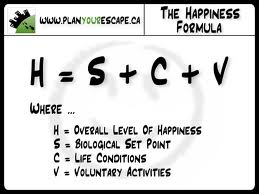The Happiness Formula
According to Martin Seligman (the leading cheer in Positive Psychology) there is a formula to determine your happiness levels.
Following a study by Diener & Seligman which reported that the happiest people are those with a rich & fulfilling social life, Seligman introduced a happiness formula which reads as follows:

With a little more detail:
H = Your level of happiness
S = A set range of genetically determined levels of happiness. Often accounting for 50% of the happiness quotient
C = Circumstances we’ve considered. Think of it as options. Often accounting for 10% of the overall happiness percentage
V = Factors under our Voluntary Control and refer to intentional and fulfilling practices a person chooses to engage in. Often accounting for 40%.
My Personal Thoughts
I think you have to put a few things into context before applying this to yourself.
Firstly, consider what is a fulfilling social life for you. If you’re like me it will be ‘few people in, maximum friendship, understanding & happiness out’. For others it may be about how much of a social butterfly they can be, mixing social & work circles, multiple windows of events in a given evening. Each is valid and each has its appeal to certain types of people. Identification with certain groups of people may also be a factor. Also important here are personal relationships.
Secondly, I’m not sure I hold with the view that 50% of your happiness quota is genetically pre-disposed. I can allow myself to accept that there is a part of our mental wellbeing that is passed on somewhere in the genetic code but at 50% I consider that limiting. Does this mean you can only double your happiness? This seems to allow poor room for growth or change, especially for those who are ‘less up’ than others. If, perhaps, it represents a doubling of your happiness from point to point then I’m good with it. But as an entirety of happiness, I’m less taken with the percentage.
Thirdly, options and voluntary decisions equal Empowerment & Autonomy. This is the most important part for me. No-one will be at their best or happiest if they feel under duresse. Likewise if they feel that an outcome or situation is forced upon them. The ability to weigh up options and make an informed and preferred choice will carry with it more value and persistence in the longer term. Often this is a key factor in motivation and feeling very much in control of your circumstances.
Conclusion: Definitely Useful
Although I wouldn’t necessarily agree with the weightings of S,C & V (but I will defer to the expert!), there is real value in this. For me, the formula offers an approach to reviewing your own levels of happiness, the constituents within it and your choices to improve upon it.

